Want to know why Smart TV app development is a big deal? With better internet, more people using smartphones, and everyone loving video on demand content, Smart TV apps are becoming super popular.
But it’s not just because of the pandemic. New tech like blockchain and artificial intelligence are changing how we watch videos.
For businesses, having a Smart TV app is a smart move! It helps them reach more people, get noticed, and make money through subscriptions or ads.
Smart Tv Apps Market size was valued at USD 451.26 Billion in 2023 and is projected to reach USD 571.58 Billion by 2031, growing at a CAGR of 9.90% during the forecasted period 2024 to 2031.
Source: Verified market research
In this blog, we’ll talk about everything you need to know about Smart TV app development like what’s trending, the best features, and how much it costs. Whether you’re a developer, a business owner, or just curious, this guide has something for you.
Let’s get started and see how Smart TV apps are making watching videos even better!
Key Takeaways
- Smart TV apps are growing in popularity due to their increasing use and the demand for better entertainment experiences.
- Choosing the right platform is critical to ensure compatibility with devices like Roku, Android TV, and Samsung Hub.
- Smart TV apps are essential for businesses aiming to improve user engagement, brand visibility, and customer loyalty in the digital space.
- Cost factors for TV app development include the platform chosen, app complexity, and the experience of the development team.
What is Smart TV App Development?
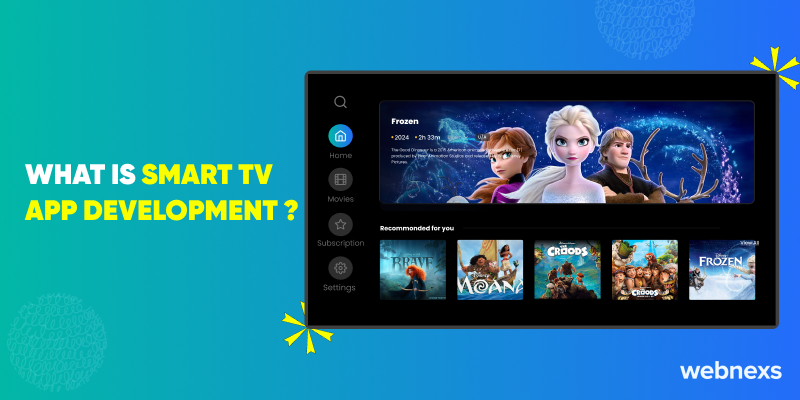
TV app development specifically focuses on developing application for smart tv platforms like Apple TV, android tv and Roku which helps the users to access streaming services, interactive content and personalized media experiences on their TV.
Smart TV apps must also implement popular services such as video streaming platforms and gaming functionalities. It’s essential to test the app on different devices to ensure the smooth performance and stability.
Additionally, security features like encryption and data protection play a vital role in safeguarding user information and preventing unauthorized access.
If You’re Looking For a Powerful Smart TV App?
Key Trends and Growth in Smart TV Usage
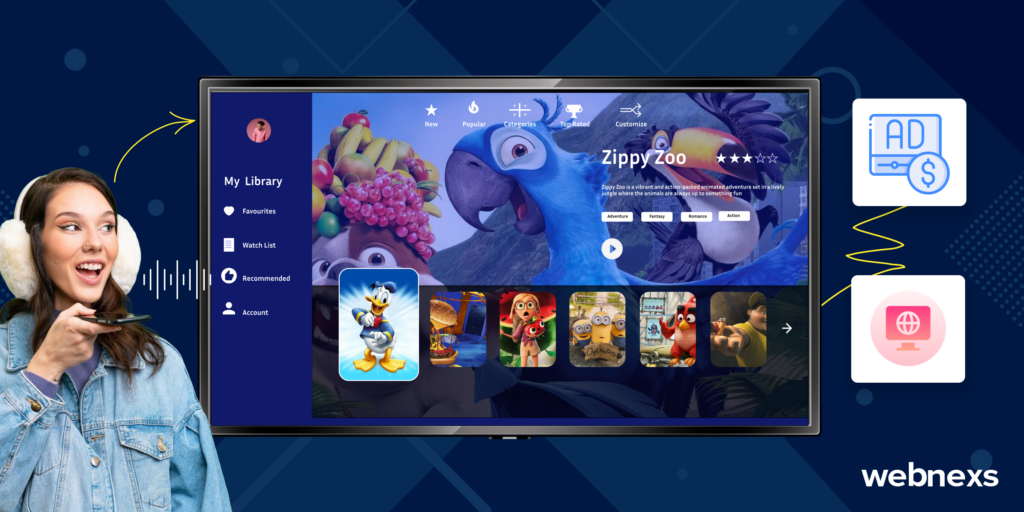
TV usage has seen exponential growth worldwide, driven by advancements in internet connectivity, affordable pricing, and the rise of on-demand content consumption. Here are some key trends and supporting statistics illustrating this rapid adoption
Increasing Smart TV Adoption Globally
According to Statista, global TV sales surpassed 230 million units in 2022 and are expected to reach nearly 270 million units by 2026. The proliferation of affordable TVs and consumer desire for internet-connected devices are key factors driving this trend.
Rise of OTT Platforms
The growth of OTT platforms has heavily influenced TV usage. In India alone, the number of OTT platform subscriptions is projected to reach around 500 million by 2025, a significant portion of which will come through Smart TVs. Globally, services like Netflix, Disney+, and Hulu report that a large percentage of their viewing hours are streamed via Smart TVs, making these platforms central to entertainment consumption
Enhanced Viewing Experience with 4K and 8K Content
As TV app development advances, the demand for high-definition content is also growing. In the U.S., over 60% of Smart TVs sold in 2023 were 4K-compatible, and the rollout of 8K TVs is expected to further enhance viewing quality. This push for high-resolution content is encouraging streaming services to optimize their offerings for TVs, creating more tailored, high-quality experiences.
Voice-Control Integration and AI-Powered Features
Voice commands have become a standard feature in modern TV app developement, with built-in voice assistants like Google Assistant and Amazon Alexa allowing users to search for content, control volume, and access other features hands-free. A survey by Parks Associates revealed that 36% of Smart TV users in the U.S. regularly use voice control features, highlighting the demand for user-friendly, accessible interfaces.
Growth in Advertising Revenue through Connected TV (CTV)
Smart TVs are also driving growth in Connected TV (CTV) advertising. eMarketer estimates that U.S. CTV ad spending will hit $27.5 billion in 2024, a jump from $21.2 billion in 2022. This shift signifies that brands are seeing high value in advertising on TVs, reaching consumers directly in their homes through ad-supported apps and streaming services.
Key Features to Consider While Creating a Smart TV App
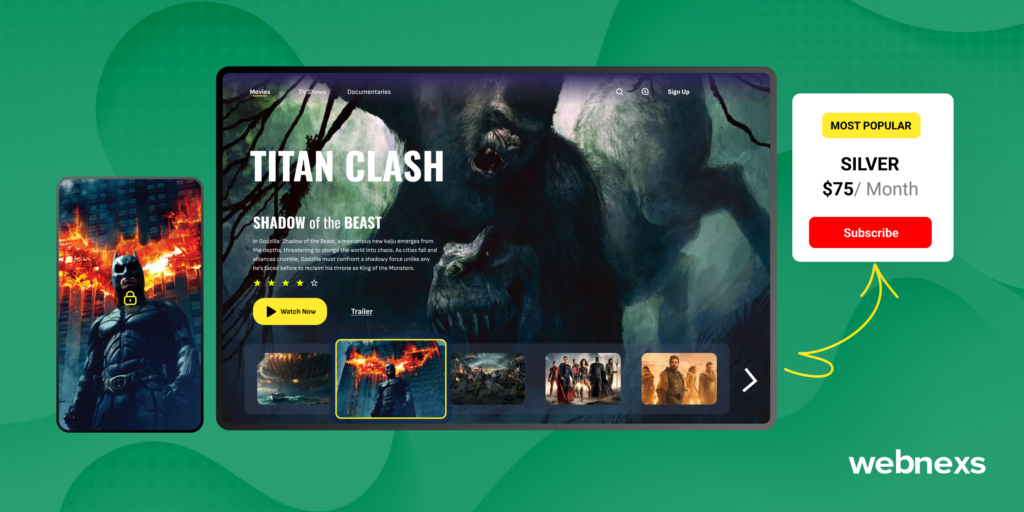
Demand
The development of a TV app leads to the rising demand for on-demand content that users can access directly on larger screens.
As streaming services become more popular, businesses can take advantage of this trend to improve user engagement and wider their audience.
Actionable insights: Optimize streaming for high-quality content like 4K or HD to meet the growing demand for better viewing experiences.
Accessibility
Making a TV app accessible ensures that a wide range of users can navigate it easily.
Introducing features such as voice commands and simple layouts makes the app more appealing and enriches the user experience.
Actionable insights: Integrate voice control, allowing users with disabilities to navigate easily
Flexibility
TV apps provide the flexibility to adapt across various devices and platforms.
By enabling multi-device functionality, businesses can offer users a consistent experience, which in turn increases user engagement and satisfaction.
Actionable insights: Offer cross-platform compatibility so users can start on one device and continue on another.
Personalization
Personalization plays an important role in user satisfaction and retention.
Features like content recommendations and customizable settings allow for a tailored experience based on individual viewing habits, enhancing the user experience and encouraging longer viewing times.
Actionable insights: Allow users to create profiles for personalized viewing experiences, such as tailored content or settings.
Engagement
Including features like interactive elements and social sharing helps users to stay connected and improve retention rates.
An engaging app ensures that users spend more time interacting with the content, benefiting both the users and the brands involved.
Actionable insights: Integrate social sharing options for users to easily share content and engage with their networks.
Revenue
Smart TV apps open up various revenue streams through subscriptions, ad revenue, and in-app purchases.
These monetization strategies enable businesses to maximize their revenue potential and support ongoing growth.
Actionable insights: Consider offering both subscription (SVOD) and ad-supported (AVOD) models to cater to different user preferences.
Scalability
Scalability is key for TV app development, allowing them to increase numbers of users and content as demand grows.
This capability ensures a smooth user experience and positions the app for future growth, keeping it competitive in a rapidly changing market.
Actionable insights: Build the app with cloud technology to handle increasing numbers of users and larger amounts of content.
Global Reach
Smart TV apps offer businesses a chance to connect with a wide-ranging, international audience.
By implementing various languages and cultural preferences, these apps enhance brand visibility and facilitate growth in different markets.
Actionable insights: Optimize payment methods to accept a wide range of currencies and payment options to facilitate global transactions.
Data Insights
Utilizing data insights from user interactions allows for the refinement of content offerings and the targeting of specific audience segments.
This data also supports more effective branding and monetization strategies, which can increase engagement and encourage loyalty.
Actionable insights: Implement features to monitor app usage, which will help in identifying improvement areas for better user satisfaction.
Branding
A TV app serves as a powerful branding tool, placing your brand right in the user’s living room.
Custom logos and user interfaces create memorable experiences that strengthens the brand’s identity and presence.
Actionable insights: Build user trust by providing great customer support and ensuring the app is reliable and user-friendly.
Ad Revenue
In-app advertisements provide an additional revenue stream for TV apps, particularly through formats like video ads or sponsored content.
This ad revenue complements subscription income, increasing the app’s overall profitability.
Actionable insights: Utilize AVOD models to generate revenue through ads while offering free content to attract users.
Cost Efficiency
Creating a TV app that functions across multiple platforms is cost-efficient, as it minimizes the need for separate versions.
These cost-effective solutions ensure broader reach without compromising quality, supporting sustainable growth.
Actionable insights: Optimize the app’s development and maintenance processes to reduce unnecessary costs.
Convenience
Convenience is key to the smart TVs experience, giving users easy access to a wide range of content in one location.
This accessibility enhances user satisfaction and encourages repeat usage, leading to higher retention rates.
Actionable insights: Make sure the app is available across multiple platforms and offers flexible viewing options.
Multi-Device
Support for multiple devices allows users to shift smoothly between TVs and tablets, enhancing user engagement.
Offering a consistent experience across devices increases satisfaction and loyalty.
Actionable insights: Ensure the app works seamlessly across devices, allowing users to continue watching on different screens without interruption.
Customization
Options for personalization, such as themes or content suggestions, enable users to customize their experience.
This flexibility enhances user engagement and makes the app feel more relevant and personal.
Actionable insights: Provide users with the ability to set up personalized profiles or viewing preferences.
Retention
Achieving high user retention involves providing valuable and engaging content that encourages users to return.
Higher retention rates have a direct impact on the app’s revenue potential and long-term success.
Actionable insights: Focus on improving user experience and continuously update content to keep users engaged.
Innovation
Incorporating innovative features in apps, like voice control and AI-driven recommendations, keeps TV applications competitive.
Focusing on cutting-edge technology attracts tech-oriented users and encourages brand loyalty.
Actionable insights: Regularly update the app with new, creative features to keep users excited about what’s coming next.
Market Growth
The growing smart TV market presents significant opportunities for businesses.
As more households support smart TVs, this expansion makes crucial for reaching new audiences.
Actionable insights: Focus on expanding into new markets, especially in regions where TV adoption is growing rapidly.
User Experience
A smooth user experience allows users to navigate and enjoy content effortlessly. A well-designed app increases satisfaction and contributes to higher user retention and engagement.
Actionable insights: Optimize app speed and functionality to enhance the overall user experience.
Competitive
A well built TV app provides a brand with a competitive edge, helping it to stand out.
Offering unique features and exceptional performance sets the app apart and enhances user loyalty.
Actionable insights: Keep an eye on competitors’ offerings and adjust the app’s features to stay competitive.
Benefits to Develop Smart TV App
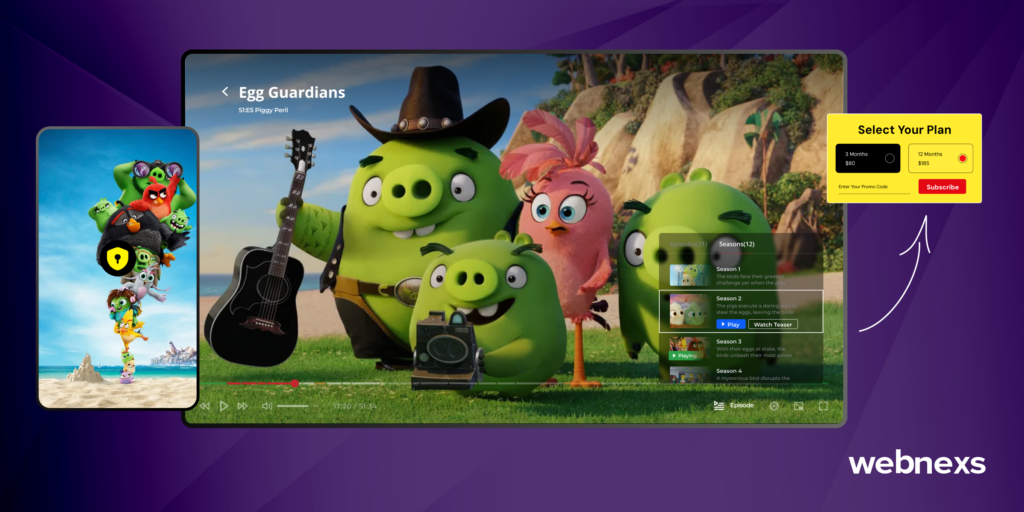
Increased Brand Visibility
Smart TV apps allow brands to connect with audiences directly on larger screens, making a significant visual impact and increasing brand exposure. This direct engagement improves recall and helps brands to take part into users’ everyday media habits.
Enhanced User Engagement
Smart TVs have better user involvement as users will spend more time with the brand and involve them with more interactive aspects like personal recommendations or social capabilities for more engagement and greater relationships with the brand.
Additional Revenue Streams
With smart TV apps, businesses can monetize through ads, subscriptions, or in-app purchases as different sources of revenue . These multiple revenue streams support sustainable growth, especially as streaming becomes increasingly popular.
Competitive Advantage
A smart TV app is a great developer of a brand as it is an innovative leader for the industry. This differentiates the brand from others to attract tech-oriented users and increase loyalty for a better viewing experience.
Points to Consider Before Developing Smart TV App
Target Audience
Understanding your app audience is important to develop content and the features based on their preferences. Analyze demographic data, viewing habits, and feedback to create a user profile.
Understanding how users watch content whether on-demand, live or through any devices so that it will be easy to create more engaging experiences that meet their needs.
User Interface
Developing a user-friendly interface is important to ensure the easy navigation and readability on large screens.
Using big fonts, simple menus and accessible controls can improve the user’s viewing experience.
Content
The selected content should be in the format which is Television friendly, so that it attracts your audience.
Try to use videographics , infographics and text in a very small amount. Formats that allow users to watch the episodic piece of content or short clips of once large pieces will satisfy the viewers.
Compatibility
To effectively target a wider audience it is important to make sure your application can be operated optimally on different TV platforms and resolutions.
Conduct compatibility testing and evaluation for various devices, including Roku, Apple TV, and Android TV.
It also ensures that a similar user experience is achieved irrespective of the device without any access issues.
Security
Security is very important in the case of managing data and financial transactions within the app.
Implement high standard encryption techniques to protect the information.
How to Develop a Smart TV Application
Define Purpose and Choose Platform
Start by clearly defining the app’s goals and target audience, as these will shape the content and features.
Then, select the appropriate smart TV platform like Roku, Apple TV, Android TV to ensure it aligns with your user base.
Setup Development Tools and Design UI
Utilize platform-specific development tools like Android Studio for Android TV to establish your environment.
Create a user-friendly interface that is optimized for larger screens, emphasizing easy navigation and readability.
Develop and Test the App
Begin coding the app, implementing the desired features and functionality.
Perform thorough testing on various devices to ensure compatibility, performance, and a smooth user experience across different TV platforms.
Publish and Promote
After completing development and testing, publish the app to the selected platform’s app store. Use targeted marketing strategies to promote it, aiming to reach your intended audience and enhance app visibility.
Thinking About Creating a Smart TV App With Branded Customization Features?
Challenges to Face Before Developing a Smart TV App
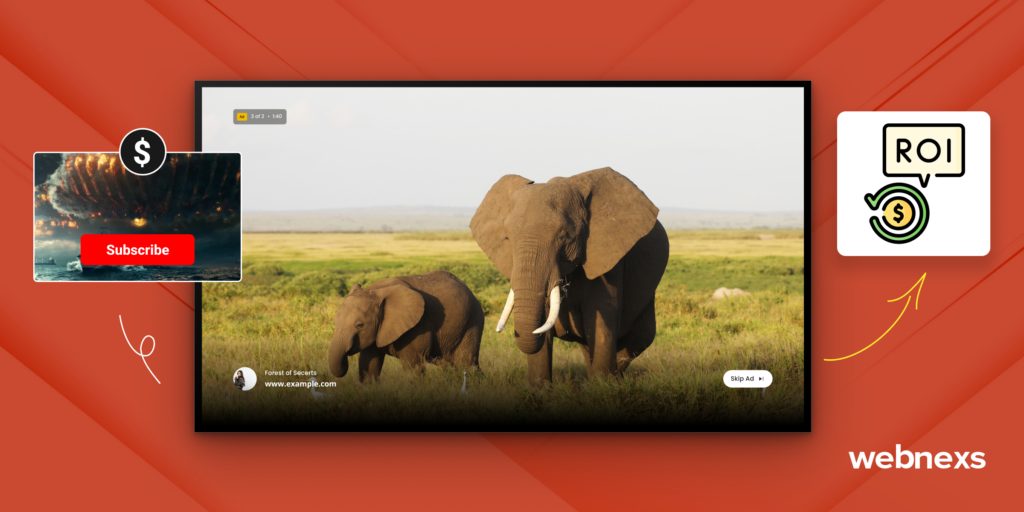
User Interface and Navigation Constraints
Creating a user-friendly interface for TVs presents challenges due to the screen size, navigation limitations, and reliance on remote controls.
The layout needs to be visually accessible to improve the user experience on larger displays.
Target Audience Expertise
It’s important to understand how familiar the target audience is with TV platforms.
Some users may require simpler interfaces, while others might prefer more advanced features. Personalizing the design to match their skill levels can lead to better user engagement.
Cost of Subscription vs Investment made
Finding the right balance between subscription pricing and the initial investment in development is a key to achieve profitability.
The pricing strategy should attract users while also covering costs to establish a sustainable revenue model.
Time Frame to Take out ROI
It’s important to ensure a reasonable return on investment within a defined time frame.
This requires strategic planning for monetization, marketing, and user acquisition to efficiently reach profitability.
Smart TV Apps For Varied Platforms
They can develop smart TV apps for various platforms such as Android TV, Apple TV, Roku, Samsung TV, and LG TV. Each platform has its development process and requirements that need to be followed to ensure a smooth and successful app launch. In this section, we will explore the different TV apps available on these platforms.
Android TV
It is an operating system developed by Google for Smart TVs and digital media players. Android TV apps are designed using the same Android OS and can be downloaded from the Google Play Store. These apps offer a seamless experience to they can control users accessing OTT platforms and using remote or voice commands.
Apple TV
It is a digital media player and a Smart TV app development operating system developed by Apple Inc. Apple TV apps are designed using the tvOS operating system and can be downloaded from the App Store. These apps provide a user-friendly interface and can be accessed using Siri voice commands.
Amazon Fire TV
It is a highly competitive market in the ever-evolving realm of over-the-top applications, as the constant battle for supremacy continues to rage on. Amazon Fire TV has taken the television industry by storm, dominating the field as the foremost OTT streaming platform. If you desire to compete with cutting-edge technology and increase your reach to a wider audience, then it would be wise to engage Amazon Fire TV application developers to create a bespoke application for your brand.
Roku TV
Roku TV is an operating system developed by Roku Inc. for TVs and digital media players. According to statistics, the revenue share of leading online video platforms has witnessed a substantial rise of approximately 25%. Users due to their ability to provide optimal satisfaction highly favored these platforms and greater audience reach.
Roku TV apps are designed using the Roku SDK and can be downloaded from the Roku Channel Store. These apps provide a simple and intuitive interface and can be controlled using remote or voice commands.
Samsung TV
This TV operating system developed by Samsung Electronics. Samsung TV apps are designed using the Tizen operating system and can be downloaded from the Samsung TV app store. These apps offer a personalized and interactive experience to users and can be accessed using voice commands.
LG TV
LG Electronics developed this LG TV. They designed LG TV apps using the webOS they can download operating system and from the LG Content Store. These apps provide a smooth and user-friendly interface and can be controlled using voice commands.
How Much Does It Cost To Build A Smart TV App Development?
The cost of building a Smart TV app depends on several factors such as the app’s complexity, platform, and features. In this section, we will discuss the various factors that can impact the cost TV app development.
App Complexity
The complexity of the app is one of the most significant factors that can impact its development cost. Simple apps with basic features will cost less compared to complex apps with advanced features.
Platform
The cost of developing a Smart TV app also depends on the platform for which it is being developed. Developing an app for a single platform such as Android TV or Apple TV will cost less compared to developing an app for multiple platforms.
Features
The features of the app also play a crucial role in determining the development cost. Apps with advanced features such as voice control, personalization, and social integration will cost more compared to apps with basic features.
Development Team
The development team’s size and experience can also impact the cost of developing a TV app. Hiring a team of experienced developers will cost more compared to hiring a small team or a freelance developer.
Testing and Maintenance
We should also consider the cost of testing and maintaining the app while calculating the overall development cost. Testing and maintenance are ongoing processes and require a significant investment of time and resources.
6 Best Smart TV App Development Solutions
Webnexs
Webnexs offers a well built platform for creating TV apps, catering to various sectors such as streaming and retail.
Known for its adaptability and customization options, Webnexs enables businesses to craft unique, branded experiences that engage with their audience.
Features:
- Advanced search bar
- Social media integration
- Multiple formats support
- Multi-lingual support
- Offline streaming
Flicknexs
Flicknexs provides a flexible OTT and live streaming solution that includes smart TV app development features.
Its platform is equipped with tools for managing content, analyzing performance, and monetizing offerings, making it easier for businesses to deliver content across multiple devices.
Features:
- Multiple format support
- Dolby audio format
- Promotional offers to subscribers
Muvi
Muvi is a comprehensive solution that allows businesses to establish their own streaming services.
With integrated features for live streaming, monetization, and worldwide distribution, Muvi facilitates app development for platforms such as Roku, Apple TV, and Amazon Fire TV.
Features:
- Metadata management
- Biometric authentication
- Import/export content
- Device management
Kaltura
Kaltura is dedicated to delivering highly customizable video experiences for enterprises, educational institutions, and media organizations.
Its TV app solution includes interactive features, strong content management capabilities, and advanced analytics to enhance audience engagement.
Features:
- Unlimited media storage
- Data retention policy
- Media hosting
- Flexible API framework
Dacast
Dacast takes a straightforward approach to TV app development, focusing on live streaming and video-on-demand services.
With flexible pricing and features like real-time analytics, Dacast is perfect for businesses looking for quick and efficient streaming solutions.
Features:
- Multiple platform support
- 24/7 customer support
- Animated thumbnails
- Onboarding tutorials
Wowza
Wowza is known for its expertise in live streaming and VOD services for smart TVs, prioritizing scalability and low latency.
Wowza ensures high-quality video delivery and offers extensive support for integration across various TV platforms.
Features:
- Incredible flexibility
- Robust security and stream protection
- Builder friendly tools
- Complete control
Conclusion
TV app development can provide businesses with a unique opportunity to reach a wider audience, increase brand visibility, and generate additional revenue. However, it is important to consider the various factors that can impact the development cost and ensure that the app meets the target audience’s needs and preferences. By following best practices and leveraging effective marketing strategies, businesses can successfully launch and promote their Smart TV app and achieve long-term success.
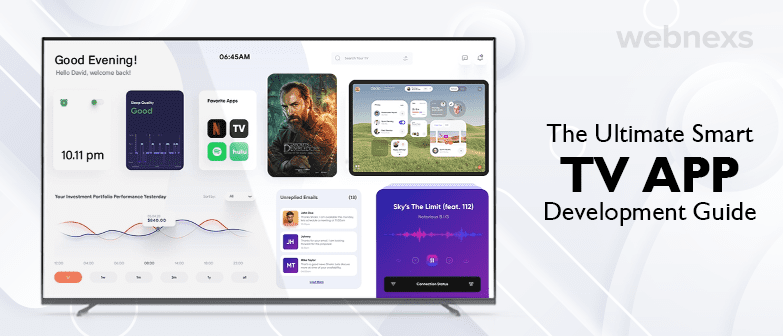


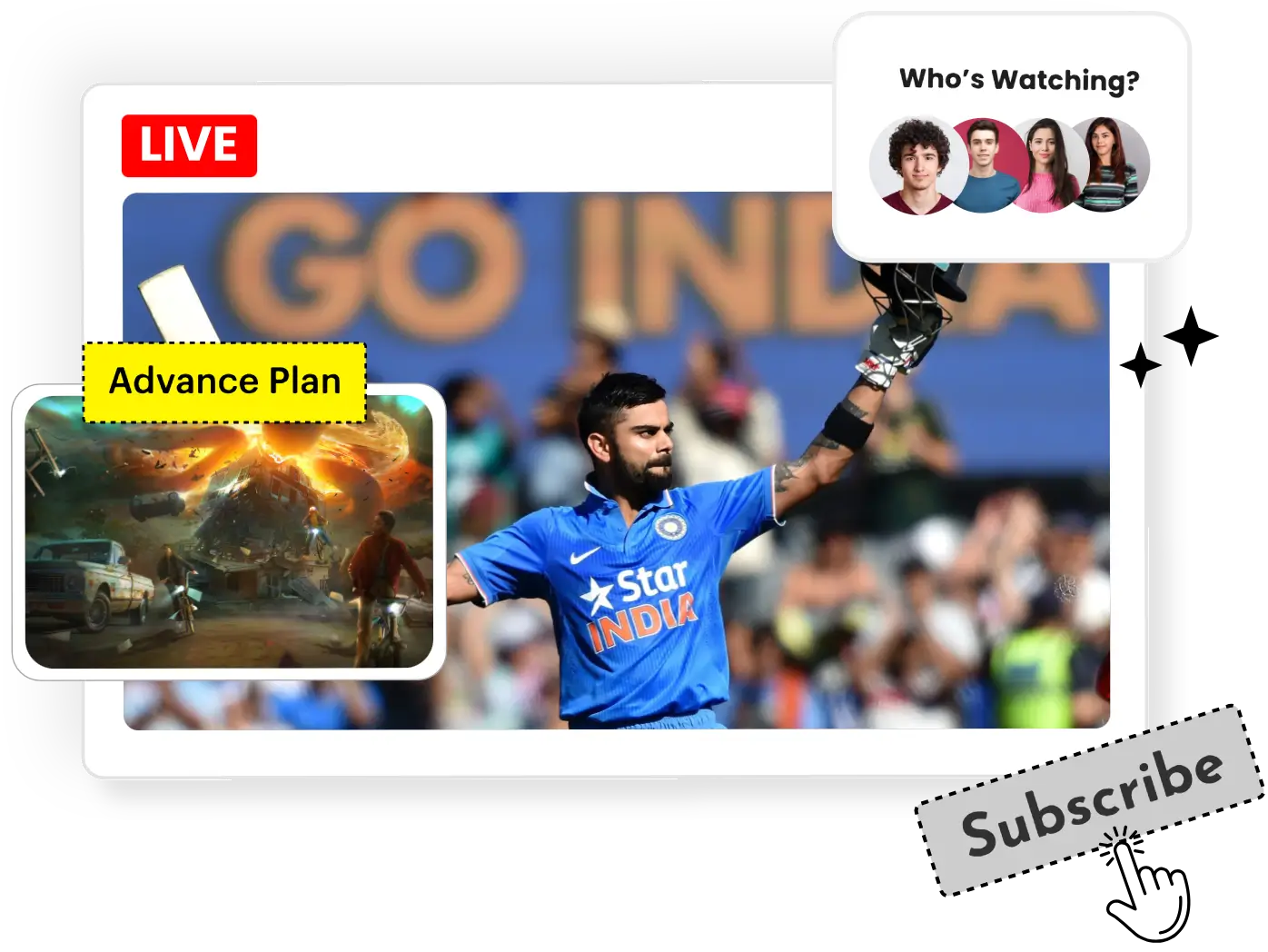
6 Responses
Fantastic post! The breakdown of smart TV app features was very detailed and helpful. Great job!
Very informative post! How do I ensure my app runs smoothly on different smart TV devices?
Thank you! To ensure smooth performance, it’s important to test the app on multiple devices and optimize it for different screen sizes. We can help you ensure compatibility across platforms. For more details, reach out to us https://www.webnexs.com/contact-us.php
Fantastic blog! Can I integrate ads into my smart TV app?
Thank you for your question! Yes, integrating ads into your app is possible, and we can help you with ad network integration to generate revenue. Let us know your specific needs,kindly fill your requirement at https://www.webnexs.com/contact-us.php
This blog is extremely insightful and well-written! It makes smart TV app development much clearer and more approachable. Great work!